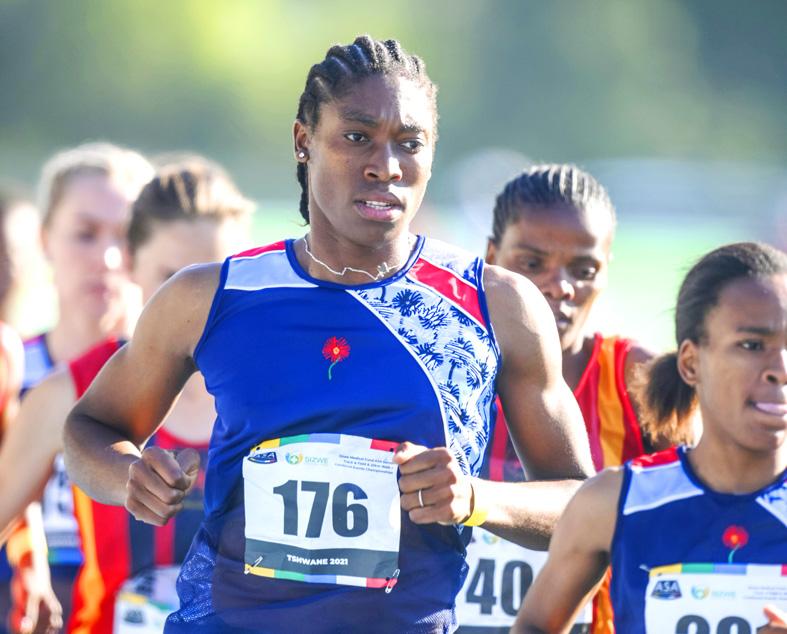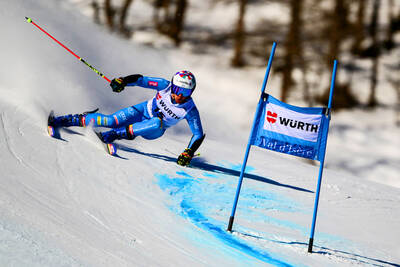This could be it for Caster Semenya and the Olympics. Forced out of her favorite race by World Athletics’ testosterone rules, the two-time Olympic champion in the 800m took a late shot at qualifying for Tokyo in the 5,000m — an event not affected by the hormone regulations — but she came up short.
Now, the 30-year-old Semenya’s hopes of making it back to the Olympics are dwindling.
The South African once said that she wanted to run at top track events until she was 40. Now, her ambitions depend on a final, long-shot legal appeal of the testosterone rules or transforming from the world’s dominant middle-distance runner into a successful long-distance athlete, which would be difficult for her.

Photo: AP
Semenya is the athlete that has perhaps stoked the most controversy in track and field over the past decade. If there are no more appearances on the biggest stage, it has been a career like no other.
In 12 years at the top, Semenya has won two Olympic golds and three world championship titles, but her success has come amid near-constant interference by track authorities. She has only competed free of restrictions of one type or another for three of those 12 years.
In 2018, World Athletics introduced rules that it said were aimed at female athletes with differences of sex development, or DSDs. The key for the governing body is that these athletes have testosterone levels that are higher than the typical female range, which it says give them an unfair advantage.
Semenya is the highest-profile athlete affected by the regulations, but not the only one.
The rules demand that Semenya lower her testosterone levels artificially — by either taking birth control pills daily, having hormone-blocking injections or undergoing surgery — to be allowed to run in races from 400m to the mile.
Semenya has simply refused to do that, pointing out the irony that in a sport where doping is such a scourge, authorities want her to take drugs to be eligible to run at the Olympics.
“Why will I take drugs?” Semenya said in 2019. “I’m a pure athlete. I don’t cheat. They should focus on doping, not us.”
The regulations mean that Semenya can compete in the 100m, 200m and long-distance races without lowering her testosterone levels. Field events are also unregulated.
Semenya attempted to qualify for Tokyo in the 5,000m, but she never came within 20 seconds of the Olympic qualifying mark.
Semenya continues to fight against the testosterone regulations in court. She has launched three legal appeals against the rules, calling them unfair and discriminatory.
The issue will not disappear with Semenya. Just this week, two 18-year-old female athletes from Namibia were barred from competing in the 400m at the Tokyo Olympics after medical tests found that they had high natural testosterone levels.
One of them, Christine Mboma, is the world under-20 record holder.
The two runners that finished second and third behind Semenya at the 2016 Olympics, Francine Niyonsaba of Burundi and Margaret Wambui of Kenya, have publicly said that they also are affected by the testosterone regulations and have been banned from the 800m, unless they undergo medical intervention.
Niyonsaba has qualified for the Olympics in the 5,000m.
Semenya has been clear that the rules would not force her out of track — that she would keep running and keep enjoying the sport, even if she cannot go to the biggest events.
“Now is all about having fun,” she said at a meet in South Africa in April. “We’ve achieved everything that we wanted, all the major titles, inspiring the youth.”
“For me, it’s not about being at the Olympics,” she said. “It’s being healthy and running good times and being in the field the longest.”

By the time Cameron Menzies finally left the arena on Monday, the blood gushing from the gash on his right hand had trickled down his wrist, part of his forearm and — somehow — up to his face. Smeared in crimson and regret, and already mouthing sheepish apologies to the crowd, he disappeared down the steps, pursued by a stern-looking Matt Porter, the chief executive of Professional Darts Corp (PDC). The physical scars from Menzies’ encounter with the Alexandra Palace drinks table after his 3-2 defeat against Charlie Manby at the Darts World Championship would be gone within a few weeks.

Manchester United on Monday blew the lead three times to miss out on moving up to fifth in the Premier League as AFC Bournemouth would not be beaten in a thrilling 4-4 draw at Old Trafford. United have lost just once in their past 10 games, but Ruben Amorim would be frustrated as more points at home were frittered away despite arguably the best attacking display of his reign in charge. Amad Diallo and Casemiro gave the hosts a halftime lead either side of Antoine Semenyo’s equalizer. Two Bournemouth goals from Evanilson and Marcus Tavernier in seven minutes at the start of the

LOW-GOAL SHOOT-OUT: Of the nine penalties in the shoot-out, only three went in, with Flamengo’s Samuel Lino, and Vitinha and Nuno Mendes of PSG netting Matvei Safonov on Wednesday made four straight penalty saves in a penalty shoot-out to help Paris Saint-Germain beat Flamengo in the Intercontinental Cup final and win a sixth trophy of the year. The Russian goalkeeper was thrown in the air by his teammates after his exploits in the shoot-out, which was won 2-1 by PSG after a 1-1 draw after extra-time. It completed a trophy-laden 12 months for the French team, who had already won the Trophee des Champions, Ligue 1, the Coupe de France, the UEFA Champions League and the UEFA Super Cup — also on penalties against Tottenham Hotspur in

Italian Luca de Aliprandini described Saturday’s World Cup giant slalom at Val d’Isere as the hardest race of his life, coming two days after his Swiss partner Michelle Gisin suffered a heavy fall in training which required neck surgery. De Aliprandini finished 26th in the men’s event won by Loic Meillard, but the result paled into insignificance with two-time Olympic ski champion Gisin in hospital with injuries to her wrist, knee and cervical spine (neck). “It was Michelle’s wish that I race here. I couldn’t say no to her, but it was the toughest race of my entire life,” an emotional De